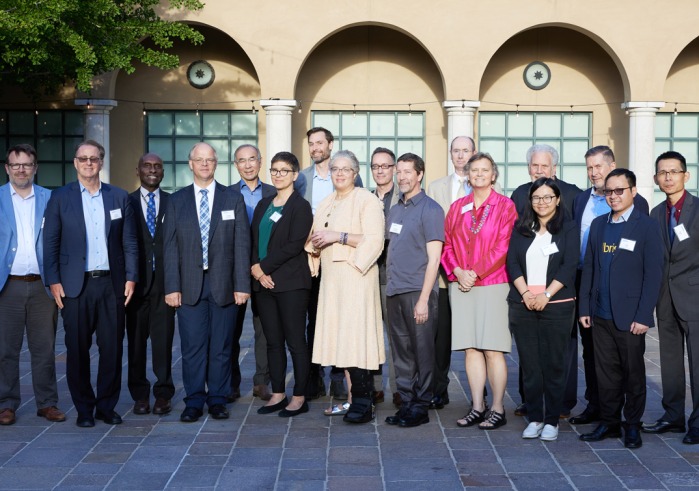Academic Leaders Gather at SUA to Explore Liberal Arts Education in the Pacific Rim

Speaking to academic leaders gathered at SUA in June, John Sexton, president emeritus of NYU, made clear the importance of their efforts to support liberal arts education. In a divisive world facing acute challenges—climate change and economic inequality to name only two—Sexton said, “universities are the last best hope.”
Twenty educational leaders representing six of the nine members of the Pacific Alliance of Liberal Arts Colleges (PALAC) met in the Athenaeum June 3-4 to begin sharing ideas and plans to encourage liberal arts education in the Pacific Rim. Joining Soka’s team of Bryan Penprase, vice president for external academic relations; Arch Asawa, executive vice president for finance and administration; and Kevin Moncrief, vice president for mission integration, were representatives from Pomona College, University of Puget Sound, Quest University Canada, Fulbright University Vietnam, and Duke Kunshan University. Teams from NYU Shanghai, Hong Kong Baptist University, and Beijing Normal University-Hong Kong Baptist University United International College tuned in online.
Running through the participants’ discussions over the two-day event was the awareness of the state of the countries around the world and the health of the planet itself, and the role of liberal arts education and the PALAC alliance in helping to address these complex, interlocking issues.
As Sexton, who was president of NYU when it opened its Abu Dhabi campus, noted in his keynote address, “A Twenty-First Century Case for a Liberal Arts Education,” evocative storytelling is needed to make the case for the possibilities of liberal arts education in cultures with less exposure to its benefits. But for liberal arts education to fulfill its potential, it must be available not just to elites, but to immigrants, refugees, and all students. In her talk following Sexton’s, G. Gabrielle Starr, president of Pomona College, asserted the need to reimagine the curriculum to adjust to a changing world. “We are still using a model of higher education from the 19th century,” she said.
Starr highlighted two important lessons from the pandemic for educators to keep in mind as they imagine the possibilities: the remarkable collaboration among nations and the scientific community that resulted in the rapid development and large-scale distribution of vaccines, and the success of putting more students pursuing careers in areas such as health care into real-world settings earlier than in the past.
“There is something incredibly powerful in collaborative education and just doing it,” said Starr, who urged alliance members to look for ways to put “students in the middle of as many places and circumstances as possible.”
Programs and Progress
Teams from each of the institutions described current initiatives that might offer opportunities for PALAC collaborations. Michael Weiner, executive vice president of academic affairs, described SUA’s learning clusters, study abroad, and offerings from the Center for Race, Ethnicity, and Human Rights. Those programs could support PALAC’s goals if SUA students, for example, visited other PALAC campuses for a learning cluster project. Language instruction might also benefit from online interactions with their students and faculty. “We need to develop new and necessary pathways if we are to produce generations of global citizens,” Weiner said.
Pomona’s Starr outlined the college’s new internationalization efforts that promise to help foster greater interdisciplinarity and global approaches to learning and urged other schools to consider similar approaches. One idea: convening groups of faculty and students on PALAC campuses to work on a single project of global importance.
Jeff Warren, vice president academic of Quest University Canada, told alliance members about that institution’s unique curriculum, which doesn’t follow traditional semesters and is largely skills- and experience-based. He also discussed potential future learning projects that build on such an approach within PALAC. Representing another institution with a novel approach, Fulbright University Vietnam, Tran Vinh Linh from the mathematics faculty described how its study programs immerse students fully in Vietnam’s culture and society. The university, which was established in 2016 but does not yet have a campus, is supported by the governments of both Vietnam and the United States.
In addition to describing the academic programs at Duke Kunshan University (DKU) and ideas including student exchange programs and workshops for faculty at PALAC institutions, Scott MacEachern addressed some of the challenges DKU—and liberal arts education in general—has faced in China in particular. MacEachern noted that liberal arts institutions, which tend to be elite and private in the U.S., haven’t always had a warm reception among Chinese students and parents, who tend to focus on future job prospects for graduates and specific career paths. Most prestigious schools in China are public, and choosing a liberal arts path presents financial hurdles for families and less possibility to realistically educate a population of China’s size.
Nonetheless, participants had no shortage of ideas about specific issues that the alliance might impact positively. A group on global climate change and migration and marginalized communities identified some important synergies between global climate change and the disproportionate impact these changes are having on marginalized communities around the Pacific region. SUA’s George Busenberg, associate professor of environmental management and policy, offered the possibility of a Pacific Environmental Project that would make materials and data on climate change accessible in a reliable, web-based format.
Looking forward, the teams identified several key areas for potential PALAC partnerships, including collaborative instruction, such as hackathons focused on solutions to particular programs, and shared online courses that could be done remotely, such as summer programs and research collaborations. A full report is available at pacificalliance.org.
